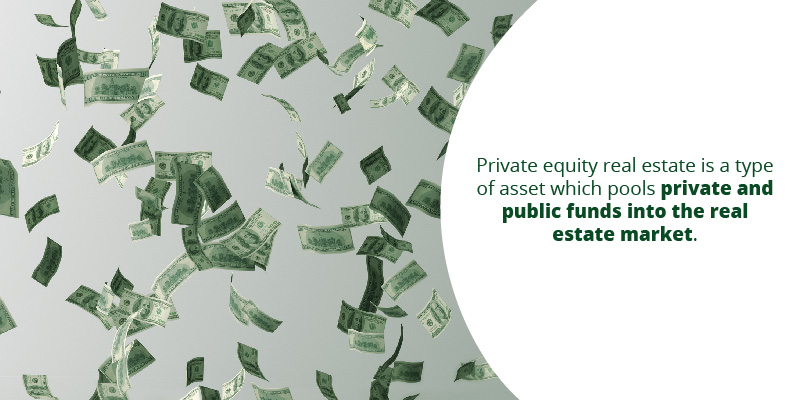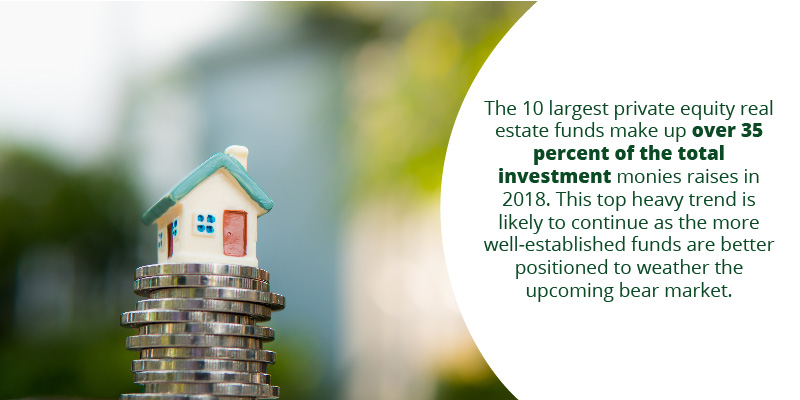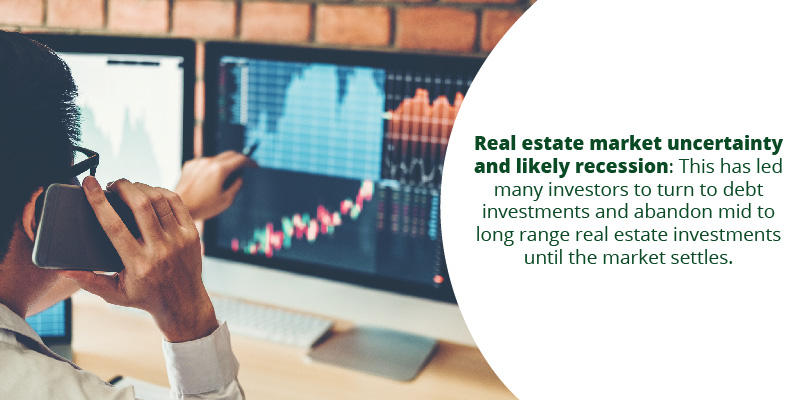
For the commercial real estate investor, private equity funds have historically been safe bets which can be used to invest in a volatile real estate market over the long term. Private equity real estate funds are typically purchased by high net worth individuals, trusts, and/or pension funds to build portfolio value. In recent years, as commercial and residential real estate markets have inflated to the tipping point of true value, real estate funds have lost their luster to some investors.
Today, we will review how private equity real estate funds function and why they are lagging behind when it comes to both performance and participation.
Real Estate Equity Funds 101

Private equity real estate is a type of asset which pools private and public funds into the real estate market. Similar to how mutual fund ownership entails privately owning a number of stocks, bonds, money market funds, and other mutual funds, private equity real estate funds entail owning multiple properties through a type of pooled vehicle. While the concept of private equity real estate has been around for since the post WWII era, private equity real estate funds truly took off during the boom or bust economy of the mid 90’s.
Also like mutual funds, private equity funds are a long term investment. There may be penalties for early withdrawals, funds are tied up in the funds, and investors must understand that most private equity funds come with a lock-up period where assets are unredeemable. Due to the nature of real estate equity funds, there is typically a substantial minimum investment both up-front and potentially over time. As we mentioned in the introduction, private equity funds are typically reserved for wealthy individuals, pension plans, or other long-term wealth building strategies.
CRE Equity Funds by the Numbers

Commercial real estate plays a huge role in private equity real estate funds, but it is not the only player. Let’s take a look at private equity numbers to get an insight into industry trends:
- 2018 saw an overall fundraising downturn of approximately 10.6 percent compared to 2017. Total 2018 investments totalled approximately $118 billion. This is the lowest annual figure since 2013.
- During that same 2013-2018 time period, commercial real estate has enjoyed a steady growth rate both in terms of average valuations and total commercial real estate investments.
- The 10 largest private equity real estate funds make up over 35 percent of the total investment monies raises in 2018. This top heavy trend is likely to continue as the more well-established funds are better positioned to weather the upcoming bear market.
- The amount of “dry powder” holdings has also gone up approximately 15 percent year over year. This could signal that investors are losing confidence while also accounting for a lack of fundraising overall.
- Despite all of this, there are still large sums of money tied up in the private equity market. Recent figures put the total valuation of the industry at approximately $244 billion spread of 670 private equity real estate funds
Why Private Equity Real Estate Funds are Losing Steam
There are a number of reasons why private equity real estate funds are slowing down. According to the latest reports, here are some of the biggest sticking points facing private equity investors looking ahead to 2020:
A crowded marketplace. Mark Twain once said, “Buy land, they ain’t making any more of it”. In today’s market, this fact of life has been highlighted by population growth, corporate buy-ups, and maturing urban markets. When it comes to private equity firms, prime real estate is going quickly as well. This is yet another reason why firms like Blackstone are dominating the market with multi-billion dollar funds focusing on the highest-value properties.

Real estate market uncertainty and likely recession. If you’ve been reading/watching the news lately, you are likely aware of some of the more grim predictions regarding a nearing recession and real estate market downturn. This has led many investors to turn to debt investments and abandon mid to long range real estate investments until the market settles.
Other investment opportunities have taken attention away from PERE. Private equity real estate funds are in a strange middle ground of being well established over decades of solid returns but without the pedigree of mutual funds or the investor excitement of new programs like opportunity zones.
Slow payouts for private equity real estate. Many real estate funds have a problem: they have too much cash. This can result in a number of hiccups, including investor payouts being delayed. This is almost a situation where the success of PEREs has led to a bogged down payout process.
Going Forward
Most industry experts agree that private equity real estate funds will continue a modest slide moving into 2020. With economic uncertainty and an already waterlogged investment environment, PEREs will likely take a few years to bounce back. Of course, it is impossible to know how economic performance, consumer spending, CRE, and other outside factors will fall into place over the coming years. Despite all of these huge question marks, private equity real estate funds meet a need for many individuals and organizations looking to buy into potentially high yield, long term investments.
